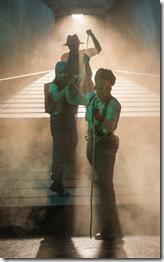
Flawed story-telling hampers potentially ground-breaking piece
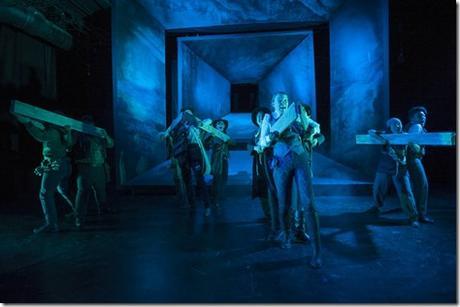
Review by Catey Sullivan
As commentary on the fact that gender is a spectrum and not a binary, Men on Boats is sporadically effective. As a retelling of the epic, death-defying 1869 voyage of John Wesley Powell, it's tediously ineffective. And as a piece of heavily physical theater, the American Theater Company production is occasionally striking, but not particularly ground -breaking or original.
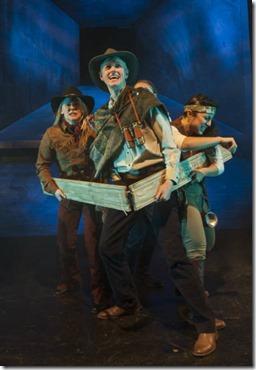
Pointedly, there are neither boats nor cis-men in Men on Boats . The boats are hinged planks gripped with varying degrees of energy as the expedition makes it way over rocks, rapids and waterfalls. As for the guys: The macho types usually associated with the taming of the American west are depicted by a 10-person cast of cis-women, transmen, and gender fluid actors whose mere presence is a marvelous and vivid reminder that gender is a spectrum, not a binary. Kudos to The Chicago Inclusion Project for casting the project. If only the cast had a project that wasn't so troubled.
Filtering the story of Powell's intrepid crew through an ensemble that doesn't fit the stereotype of a frontiersman is an excellent premise. History classes are larded with the testosterone-fueled, larger-than-life adventures of Lewis and Clark and the cowboys, miners and mountain men who followed them. Strip the macho myth of rugged individualism from the creation myth fostered by Manifest Destiny, and you've got a potentially ground-breaking and eye-opening piece of storytelling.
But the storytelling is flawed in Man on Boats , for two significant reasons. First, Davis' direction results in a production that doesn't seem to know what it is. The cast veers from the extremes of low-brow slapstick caricature to deadly serious earnestness more times than you can count. The tone is wildly uneven - at one point, you feel like you're watching "The Three Stooges on Boats." The next, you're in the center of a bleakly humorless tragedy. Obviously it's not necessary to stick strictly to one or the other - but in Men on Boats , the disparity doesn't deepen or enhance the story, it merely makes it seem sloppy and ill-conceived.
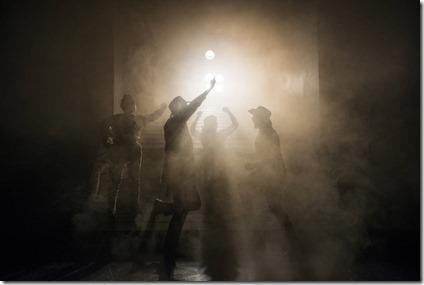
Throughout, the cast exaggerates nearly every word and gesture: In the land of low-brow comedy, the actors all put hold up signs announcing the yuks. When things get dire, everyone seems a millisecond away from literally ripping their hair out in abject devastation. Neither extreme works effectively. The exaggerated wacky antics and wide-eyed lamentations quickly become shrill and tiresome, and rob the play of both its potential humor and any serious dramatic impact it could have.
The second problem lies with Backhaus' script. She draws some of her dialogue from the journal Powell kept as he made the perilous voyage down the Green and Colorado Rivers. The trip took him and his crew deep into wilderness unmapped by white people, and was fraught with catastrophes. Boats capsized, men nearly drowned, crucial stores of bacon were lost to the raging waters. Starvation and death hovered in the spray along every last foot of the rivers wild.
Powell published his journal in 1875, and it quickly became a classic in the annals of exploration literature. But by quoting only snippets of the now-dated document, Backhaus fails to get to the heart of the document. Instead of a riveting adventure tale, Powell's words become ridiculous. The issue goes back to delivery: As Powell, Kelli Simpkins instills the words with a stilted, decorous formality that almost sounds mocking. It's as if we're hearing a parody of an explorer's journal rather than an authentic document.
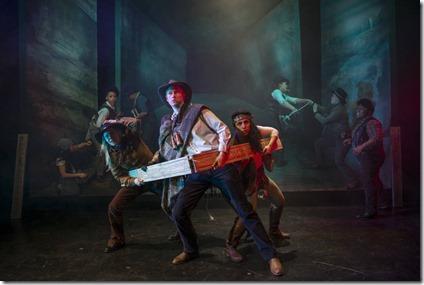
Davis has his cast in similar straits throughout, shaping an ensemble that goes broad and loud when less would be far more effective, strutting and manspreading and growling with hyper-masculine affectation from start to finish. When things become genuinely death-defying - for example, when Powell finds himself clinging by his fingernails to a cliff - Davis has the cast go for laughs rather than drama, making potentially intense scenes sophomorically silly. When the crew, on the verge of starvation, begs for sustenance from a pair of Utes, the Native Americans inexplicably speak in a tone that's a jarring mix between Valley Girl and robot.
The most successful scenes in Men on Boats are when the crew is on the water. Davis' choreography captures the grace and the heart-pounding danger of people trying to move as one through a deadly, maze of rocks and swells.
The boats themselves are rather ingenious. Hinged planks merely suggest prows, but somehow also manage to give the impression of fully-formed vessels. William Boles' set design is a simple yet effective depiction of the vast, unknown territory the men venture deeper and deeper into as they travel west. Miles Polaski's original music is richly cinematic, a soundscape worthy of an epic.
There's power in the image of women working together to ensure each other's survival, all the while refusing to be categorized in terms of traditional gender norms. Unfortunately, that power is too often buried far below the swells in Men on Boats .
Men on Boats continues through February 12th at American Theater, 1909 W. Byron (map), with performances Thursdays and Fridays 8pm, Saturdays 2pm & 8pm, Sundays 2pm. Tickets are $38, and are available by phone (773-409-4125) or online through their website (check for half-price tickets at Goldstar.com ). More information at ATCweb.org. (Running time: 1 hour 40 minutes, includes an inter mission)
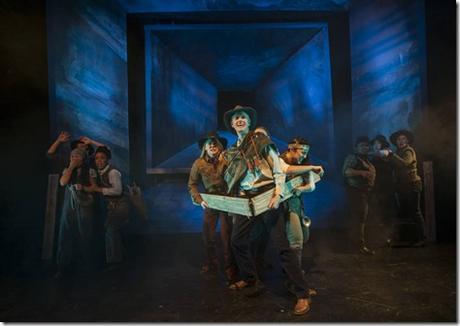
Photos by Michael Brosilow
Kelli Simpkins (John Wesley Powell), Kelly O'Sullivan (William Dunn), (John Colton Sumner), Lauren Sivak (Old Shady), BrittneyLove Smith (Bradley), (O.G. Howland), Sarai Rodriquez (Seneca Howland), Erin Barlow (Goodman), Lawren Carter (Hall), Stephanie Shum (Hawkins), Kona Burks, Emily Marso, Tiffany Williams, Ashley Hicks (understudies).
behind the scenes
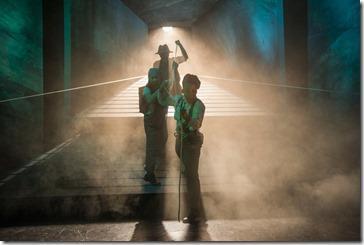
Tags: 17-0105, Alex Rhyan, Alicia Hynes, American Theater Company, Arti Ishak, Ashley Hicks, Avi Roque, Brandon Wardell, Brittneylove Smith, Catey Sullivan, Chicago Inclusion Project, Chicago Theater, Emily Marso, Erin Barlow, Jamie Karasm Katie Klemme, Katie Klemme, Kelli Simpkins, Kelly O'Sullivan, Kona Burks, Lauren Sivak, Lawren Carter, Melissa Ng, Michael Brosilow, Miles Polaski, PJ Paparelli, post, Sarai Rodriquez, Stephanie Shum, Tiffany Williams, Will Davis, William Boles
Category: 2016 Reviews, American Theatre Company, Catey Sullivan, Video, YouTube

